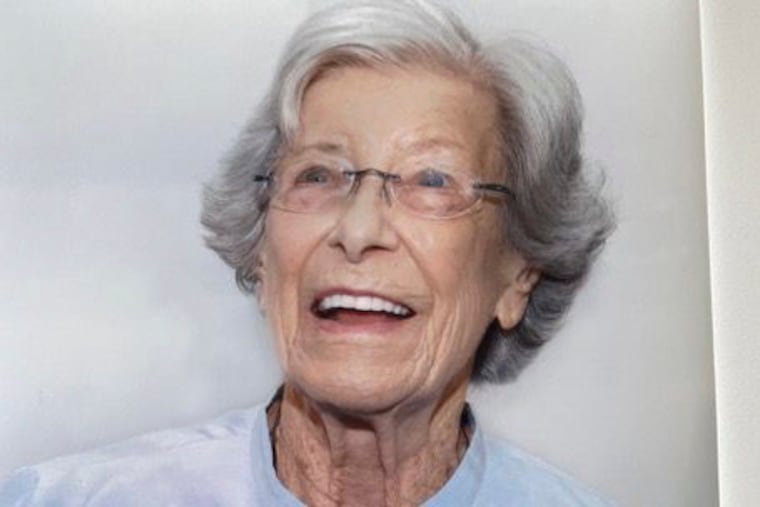Ella Schaap, ceramics curator for the Philadelphia Museum of Art, dies at 108
"At her gracious age, she lived through several eras, but with her passing it is certainly the end of one,” a colleague and admirer said of Mrs. Schaap, who died Saturday, July 10.

Ella Schaap, 108, a Philadelphia Museum of Art curator and internationally renowned expert on Dutch ceramics, died Saturday, July 10, in her Newtown home.
Mrs. Schaap came to the United States with her young family after first fleeing the Nazis and then the Japanese. She started volunteering at the Philadelphia Museum of Art, was later given responsibility for the museum’s extensive collection of Dutch ceramics, and became widely regarded as one of the world’s foremost experts.
Born in 1913, Mrs. Schaap was one of two daughters of Martin and Frederika Sanders. While she never earned a college degree, after high school she traveled to New York City to attend Barnard College as an exchange student. There, she had her first date with Dolf Schaap, a Dutch tobacco merchant some 20 years her senior who shared her taste for adventure. They married in 1934 and had three daughters.
When Hitler invaded Poland in 1939, the family fled to Indonesia, a Dutch colony at the time. With the advance of the Japanese in the Pacific, they fled again, first to San Francisco and then to the Philadelphia area.
Mrs. Schaap began volunteering at the Philadelphia Museum of Art in the 1950s, serving in various capacities. But when the family of Francis P. Garvan began donating its huge collection of Delft tiles in the late 1970s, Mrs. Schaap, with her command of the Dutch language and history, was tapped to help catalog them. She dived into the research. Before long, an international expert was born.
“Ella’s involvement with the museum as a volunteer and curator was one of the longest in our history,” noted Timothy Rub, the George D. Widener director and chief executive officer of the Philadelphia Museum of Art. “It was also a match made in heaven. With a characteristically Dutch combination of politeness and persistence, Ella was a forceful advocate for the ongoing display and continued development of our holdings of Dutch ceramics, and she succeeded in doing both. With her passing we have lost a great scholar and a dear friend.”
In 2007, Mrs. Schaap was knighted by the queen of the Netherlands for her work on Dutch culture. By then, that included publishing three books and many articles and organizing multiple museum installations and exhibitions.
In addition, the Schaaps were collectors of contemporary American and European art, some of which Mrs. Schaap later donated to museums, including the Philadelphia Museum of Art and Harvard University’s Fogg Art Museum.
“She grew up in an era where women were not in the forefront,” said one of her daughters, Ida Schmertz. “She started out that way. But it didn’t last long.”
The Schaaps were also avid sailors and kept a sailboat on the Chesapeake Bay. When Dolf Schaap died in 1985, Mrs. Schaap continued to sail, skippering solo until her mid-80s.
She remained engaged in the world, as well.
After the 2001 terror attacks, Mrs. Schaap, having fled the Nazis, refused to embrace the nationalism so popular at the time.
“My mother was one of those who put out the U.N. flag, instead of the American flag,” said her daughter Aletta Schaap. “We grew up in a family atmosphere where it was always the whole world. It wasn’t just about America or just about Holland.”
And her passion for art never waned. In addition to her curating work, Mrs. Schaap served on significant art committees.
Amsterdam-based Robert Aronson, regarded as one of the world’s leading experts on Dutch ceramics, admired Mrs. Schaap since he was a teenager.
“Ella was not only a friend, she was a scholar, an authority, a great specialist in the field of Dutch ceramics, a stable factor, and a staple of our little but global community,” he said. “At her gracious age, she lived through several eras, but with her passing it is certainly the end of one.”
In addition to her daughters, Mrs. Schaap is survived by another daughter, Martina Yamin; six grandchildren; nine great-grandchildren; and other relatives.
No formal service is planned.
Donations in her memory may be made to the Art Museum of Philadelphia’s Dutch ceramic collections at Philadelphia Museum of Art Development, P.O. Box 7646, Philadelphia, Pa. 19101-7646 or online at https://philamuseum.org/?keyword=InMemoryOf. Specify you want your gift to benefit the ceramics collection.